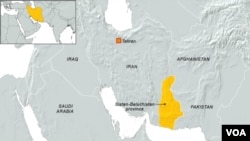Iran has vowed to retaliate against the perpetrators of Wednesday's terror attack on a military convoy that killed at least 27 border soldiers of the Islamic Revolutionary Guards Corps (IRGC) and wounded many others.
Bahram Ghasemi, a spokesperson for Iran's Ministry of Foreign Affairs, said in a statement following the attack that terrorist groups were capable of committing such an "inhumane act" because of the support of some countries in the region.
He didn't specify those countries, but Tehran has often accused UAE and Saudi Arabia in the past of supporting Sunni militant groups inside Iran, an accusation both countries have denied.
In what is seen as one of the deadliest attacks on IRGC personnel inside Iran in years, Wednesday's suicide attacker crashed an explosive-laden vehicle into a military bus, carrying IRGC elite members in southeastern Sistan and Baluchistan province.
The bombing injured more than 20 people. The death toll is expected to rise.
Iranian Revolutionary Guards corps is a U.S. designated terror organization.
Iranian state media have blamed Jaish al-Adl or "Army of Justice,” an al-Qaida-linked Sunni extremist group for the bombing. Several social media accounts affiliated with the group also took credit for the attack.
The attack comes two days after Iran marked the 40th anniversary of its 1979 Islamic Revolution.
Jaish al-Adl
Jaish al-Adl — known as JA — is a Sunni insurgent group in Iran's southeastern Sistan and Baluchistan province and has been fighting Iranian security forces in the region.
The restive Sistan and Baluchistan, which is home to many ethnic Sunni Baluch, is one of the most underdeveloped and poverty-stricken areas in the country. The ethnic group has complained about lack of economic opportunities and political freedoms in the province.
JA describes itself as a "political-military" movement and claims to be fighting to achieve justice for the "oppressed Sunni Baluch" people.
JA was founded in April 2012 by Abdul Rahim Mollazehi, a Baluch militant, after the Iranian regime captured and executed Abdul Malek Rigi, the former leader of the Jundullah insurgent group that claimed to be fighting for "equal rights of Sunni Muslims in Iran," in June 2010.
Jaish al-Adl operates primarily in Sistan and Baluchistan, but it also operates from bases in the neighboring Baluchistan province in Pakistan where it gets support from local Baluch tribes.
"Most militant groups in Baluchistan are based on tribal connections," Abdullah Haqyar, a former JA member, told VOA in a previous interview.
"These tribes have a tradition of helping and harboring members of allied tribes. Many tribes in Pakistani Baluchistan support their oppressed brothers in Iran," he added.
Local tribes control large swaths of Iran's Sistan and Baluchistan regions and neither Iranian nor Pakistani security forces have a permanent presence there.
The exact number of JA members is unknown, but according to some reports, it has over 500 members and followers.
Number of fighters
The number of active fighters is said to be over 100. Some of its fighters are seasonal, including some from Pakistan, who are called upon for occasional operations against Iranian security forces.
JA says it must fight the Shiite-dominated regime in Iran because it persecutes the Sunni minority.
"Since this regime only uses the language of force and humiliation, we have no other means but to fight back," JA said in a video statement in late 2012.
JA also said it opposes Iran's military involvement in Syria where elite Iranian forces and the Lebanese Shiite militia Hezbollah are supporting the government of Syrian President Bashar al-Assad in Syria's civil war.
Earlier this month, the group claimed responsibility for an attack on an IRGC base in southeastern Iran, killing one soldier and wounding five more. JA was also responsible for an attack in January that wounded three police officers in Zahedan, the capital city of Sistan and Baluchistan province.
VOA's Sirwan Kajjo contributed to this story.


